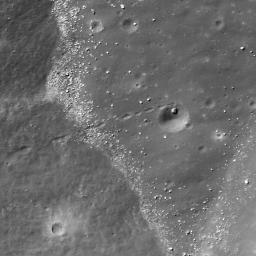skip to navigation

|
Hole in One
- Click the image above for a larger view
- Full-Res JPEG (1000 x 1000) (134.4 kB)
- Full-Res TIFF (1000 x 1000) (1.0 MB)
Caption:
A house-sized boulder (10 meter or 10 feet diameter) rolled down-hill, scoring a hole in one (~60 meter or ~66 yards diameter crater)! Portion of LROC NAC M122597190L, image width is 500 meters (547 yards) across.
Background Info:
NASA's Goddard Space Flight Center built and manages the mission for the Exploration Systems Mission Directorate at NASA Headquarters in Washington. The Lunar Reconnaissance Orbiter Camera was designed to acquire data for landing site certification and to conduct polar illumination studies and global mapping. Operated by Arizona State University, LROC consists of a pair of narrow-angle cameras (NAC) and a single wide-angle camera (WAC). The mission is expected to return over 70 terabytes of image data.
Cataloging Keywords:
| Name | Value | Additional Values |
|---|---|---|
| Target | Moon | |
| System | Earth | |
| Target Type | Satellite | |
| Mission | Lunar Reconnaissance Orbiter (LRO) | |
| Instrument Host | Lunar Reconnaissance Orbiter | |
| Host Type | Orbiter | |
| Instrument | Lunar Reconnaissance Orbiter Camera (NAC) | |
| Detector | Narrow Angle Camera (NAC), Wide Angle Camera (WAC) | |
| Extra Keywords | Crater, Grayscale | |
| Acquisition Date | ||
| Release Date | 2010-05-20 | |
| Date in Caption | ||
| Image Credit | NASA/GSFC/Arizona State University | |
| Source | photojournal.jpl.nasa.gov/catalog/PIA13156 | |
| Identifier | PIA13156 | |
